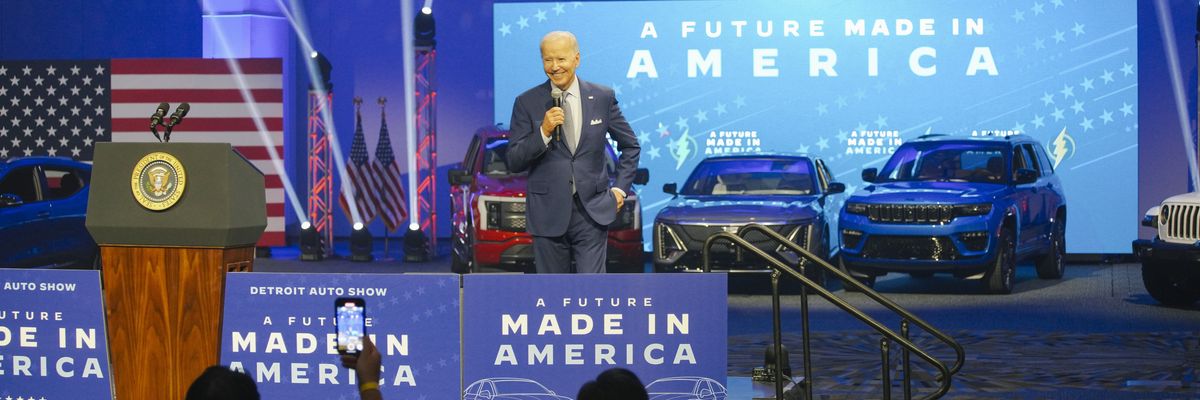In a move welcomed by progressives in Congress and a top union leader, U.S. President Joe Biden's administration on Friday announced a $15.5 billion package "primarily focused on retooling existing factories for the transition to electric vehicles" and stressed the importance of "supporting good jobs and a just transition to EVs."
The Biden administration is making available $2 billion in grants and up to $10 billion in loans for conversion projects that keep jobs in communities already home to automaker facilities, according to a statement about the package. The Department of Energy (DOE) is also planning for $3.5 billion in funding to expand domestic manufacturing of batteries and related materials for EVs and the U.S. electric grid.
"President Biden is investing in the workforce and factories that made our country a global manufacturing powerhouse," said U.S. Secretary of Energy Jennifer Granholm. "Today's announcements show that President Biden understands that building the cars of the future also necessitates helping the communities challenged by the transition away from the internal combustion engine."
The package follows the United Auto Workers (UAW) revealing last week that 97% of participating members at "Big Three" vehicle manufacturers Ford, General Motors, and Stellantis—whose brands include Chrysler, Dodge, Fiat, Jeep, Maserati, and RAM—voted to authorize a strike if a contract deal with management isn't reached by mid-September.
It also comes after the UAW on Thursday filed unfair labor practice charges against General Motors and Stellantis, accusing them of illegally refusing to negotiate in good faith and dragging out talks "with the goal of forcing the union to swallow a milquetoast contract at the last minute," in the words of UAW president Shawn Fain.
Fain on Friday celebrated the DOE package, saying that "the UAW supports and is ready for the transition to a clean auto industry. But the EV transition must be a just transition that ensures auto workers have a place in the new economy. Today's announcement from the Department of Energy echoes the UAW's call for strong labor standards tied to all taxpayer funding that goes to auto and manufacturing companies."
The UAW leader—whose union has pressured the president to use his power to help ensure a just transition to EVs—continued:
We are glad to see the Biden administration doing its part to reject the false choice between a good job and a green job. This new policy makes clear to employers that the EV transition must include strong union partnerships with the high pay and safety standards that generations of UAW members have fought for and won.
The Big Three have closed or spun off 65 plants in the last 20 years. The automakers have not yet promised job security in our ongoing negotiations. I have traveled across the country, meeting displaced workers who've had to pick up and move their families when plants shut down recently in Belvidere, Illinois, Lordstown, Ohio, and Romeo, Michigan. These new grants and loans will give plants like these a chance for federal support to ensure those jobs and communities are protected.
Granholm noted Fain's remarks on social media, saying she "couldn't agree more" that the shift to EVs must be a just transition.
Members of Congress, including Rep. Ro Khanna (D-Calif.), similarly took to social media to highlight the UAW leader's comments.
Along with also pointing to Fain's statement, Sen. Bernie Sanders (I-Vt.) said that "President Biden is right. When the federal government provides billions to the auto industry for the production of electric vehicles, the jobs that are created must be good-paying union jobs and the cars must be produced in the U.S. This new policy is an important step forward."

